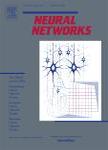版权所有:内蒙古大学图书馆 技术提供:维普资讯• 智图
内蒙古自治区呼和浩特市赛罕区大学西街235号 邮编: 010021

作者机构:Huazhong Univ Sci & Technol Sch Automat Wuhan 430074 Hubei Peoples R China Educ Minist China Key Lab Image Proc & Intelligent Control Wuhan 430074 Hubei Peoples R China
出 版 物:《NEURAL NETWORKS》 (神经网络)
年 卷 期:2019年第110卷
页 面:55-65页
核心收录:
学科分类:1002[医学-临床医学] 1001[医学-基础医学(可授医学、理学学位)] 0812[工学-计算机科学与技术(可授工学、理学学位)] 10[医学]
基 金:Natural Science Foundation of China [61673188, 61761130081, 61821003] National Key Research and Development Program of China [2016YFB0800402] Foundation for Innovative Research Groups of Hubei Province of China [2017CFA005] Fundamental Research Funds for the Central Universities of HUST, China [2018KFYXKJC051]
主 题:Event triggered Impulsive control Quasi-synchronization Memristive neural networks Time-varying delays
摘 要:This paper discusses the quasi-synchronization of memristive neural networks (MNNs) with time-varying delays via event-triggered impulsive and state feedback control approaches. The choice of different initial conditions may lead to the unexpected parameter mismatch in virtue of the state-dependent parameters of MNNs. Thus, the accurate synchronization error level and the exponential convergence rate are derived in view of the comparison principle of impulsive systems and the variable parameter formula. A co-design procedure that can be easily implemented is presented to make the synchronization error converge to a predetermined level. Then, no zeno-behavior is proved to exist in the controlled system with the proposed event-triggered condition. In addition, a self-triggered scheme is proposed to prevent continuous communication happening between the drive system and the response system. Finally, a numerical example is given to illustrate the availability of the proposed control scheme. (C) 2018 Elsevier Ltd. All rights reserved.